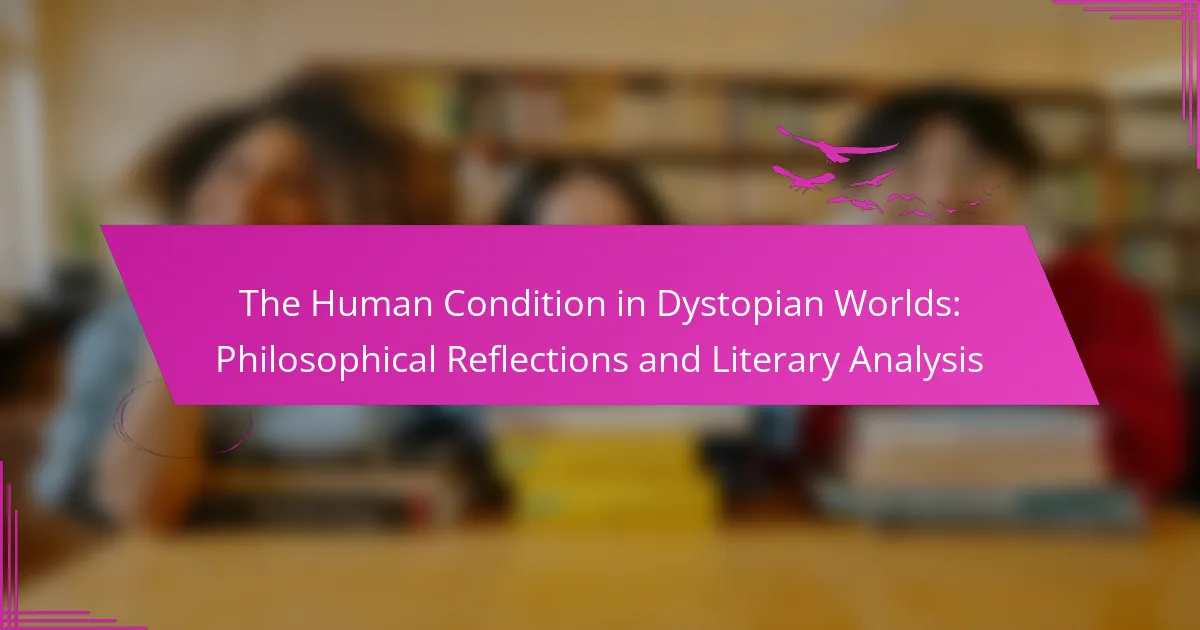Dystopian worlds challenge our understanding of the human condition by exposing themes of oppression, morality, and resilience. These narratives critique societal structures and explore the psychological impacts of totalitarian regimes. They highlight the struggle for identity and autonomy amidst extreme circumstances while prompting philosophical reflections on ethics and humanity. Through literary analysis of works like “1984” and “The Handmaid’s Tale,” we gain insights into the fragility of freedom and the importance of empathy.
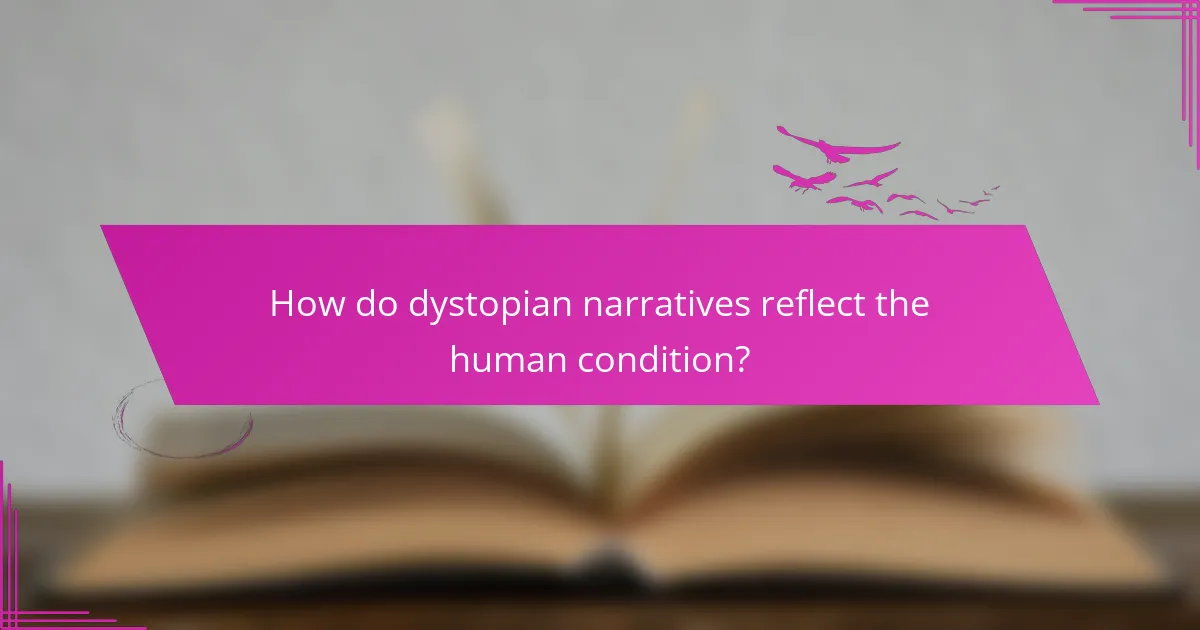
How do dystopian narratives reflect the human condition?
Dystopian narratives profoundly reflect the human condition by exploring themes of oppression, morality, and resilience. These stories often depict societies stripped of freedom, highlighting the struggle for identity and autonomy. Through characters facing extreme circumstances, authors reveal the depths of human despair and the quest for hope.
Literary works like George Orwell’s “1984” and Aldous Huxley’s “Brave New World” illustrate how totalitarian regimes manipulate truth and individuality. Such narratives encourage readers to question societal norms and consider the implications of unchecked power.
Philosophically, these narratives challenge our understanding of ethics and humanity. They pose critical questions about the nature of happiness, freedom, and the consequences of technological advancement. This reflection prompts readers to examine their own lives and societal structures.
Ultimately, dystopian literature serves as a cautionary tale, urging vigilance against complacency. By engaging with these narratives, individuals gain insight into the fragility of human rights and the importance of empathy in shaping a just society.
What philosophical questions arise from dystopian literature?
Dystopian literature raises profound philosophical questions about morality, freedom, and human nature. It explores the consequences of authoritarianism, the loss of individuality, and the struggle for meaning in oppressive environments. These narratives challenge readers to reflect on societal values, ethical dilemmas, and the essence of humanity. For example, works like George Orwell’s “1984” question the limits of government control and the nature of truth. Such literature serves as a mirror to contemporary issues, prompting critical thought about the balance between security and freedom.
Which key themes illustrate human resilience in dystopia?
Key themes illustrating human resilience in dystopia include hope, community, and the struggle for identity. Hope often serves as a driving force, motivating characters to persevere despite bleak circumstances. Community emerges as a crucial support system, fostering collaboration and solidarity among individuals facing oppression. The struggle for identity highlights the importance of personal and cultural narratives in maintaining humanity amidst dehumanizing environments. These themes collectively emphasize the strength of the human spirit in overcoming adversity.
How do different cultures interpret the human condition in dystopian contexts?
Different cultures interpret the human condition in dystopian contexts through unique philosophical lenses and literary traditions. For example, Western literature often emphasizes individualism and existential despair, reflecting concerns about personal autonomy in oppressive systems. In contrast, Eastern narratives may focus on communal values and the collective struggle against authoritarianism, highlighting social harmony versus chaos.
Cultural symbols also play a significant role in these interpretations. In Japanese dystopian works, themes of nature and technology often intersect, revealing a deep philosophical inquiry into humanity’s relationship with the environment. Meanwhile, Latin American literature frequently incorporates magical realism, blending the surreal with harsh realities, which serves to critique socio-political issues.
Historical contexts shape these interpretations as well. For instance, post-colonial narratives in African literature often address the legacies of colonialism and the quest for identity in dystopian settings. This reflects a rare attribute of cultural resilience amidst systemic disillusionment.
Overall, the diverse interpretations across cultures enrich the understanding of the human condition in dystopian narratives, revealing a complex interplay of values, fears, and hopes.
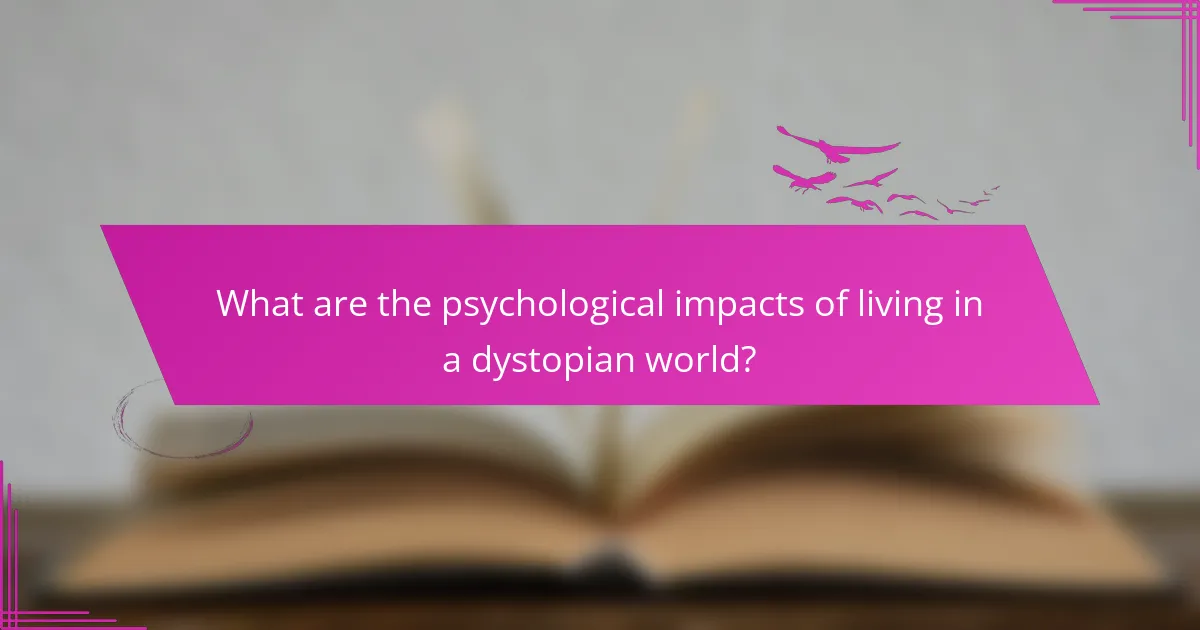
What are the psychological impacts of living in a dystopian world?
Living in a dystopian world can lead to significant psychological impacts, including anxiety, hopelessness, and desensitization. Individuals often experience a loss of agency and increased fear due to oppressive societal structures. This environment can distort personal identity, leading to existential crises and social withdrawal. Literature reflects these themes, illustrating how characters cope with despair and seek meaning in bleak circumstances. For instance, works like “1984” and “The Handmaid’s Tale” provide insight into the human condition under extreme duress, emphasizing resilience amidst adversity.
How does fear shape human behavior in dystopian settings?
Fear profoundly influences human behavior in dystopian settings by driving individuals to conform, resist, or seek survival. In such environments, fear can manifest as a tool for control, leading to compliance with oppressive regimes. Characters often experience heightened anxiety, which shapes their decisions and relationships. For example, in George Orwell’s “1984,” fear of surveillance compels citizens to suppress dissent, illustrating how fear can erode individuality. Ultimately, fear serves as both a catalyst for conflict and a mechanism for societal cohesion in dystopian narratives.
What role does hope play in the survival of characters in dystopian stories?
Hope is crucial for character survival in dystopian stories, acting as a driving force against despair. It motivates characters to resist oppressive systems and seek change. In many narratives, hope manifests as a unique attribute, enabling characters to envision a better future despite dire circumstances. This emotional resilience often leads to collective action, fostering community bonds that further enhance survival chances. Ultimately, hope serves as a rare yet powerful catalyst, inspiring characters to endure and fight for their beliefs in bleak settings.
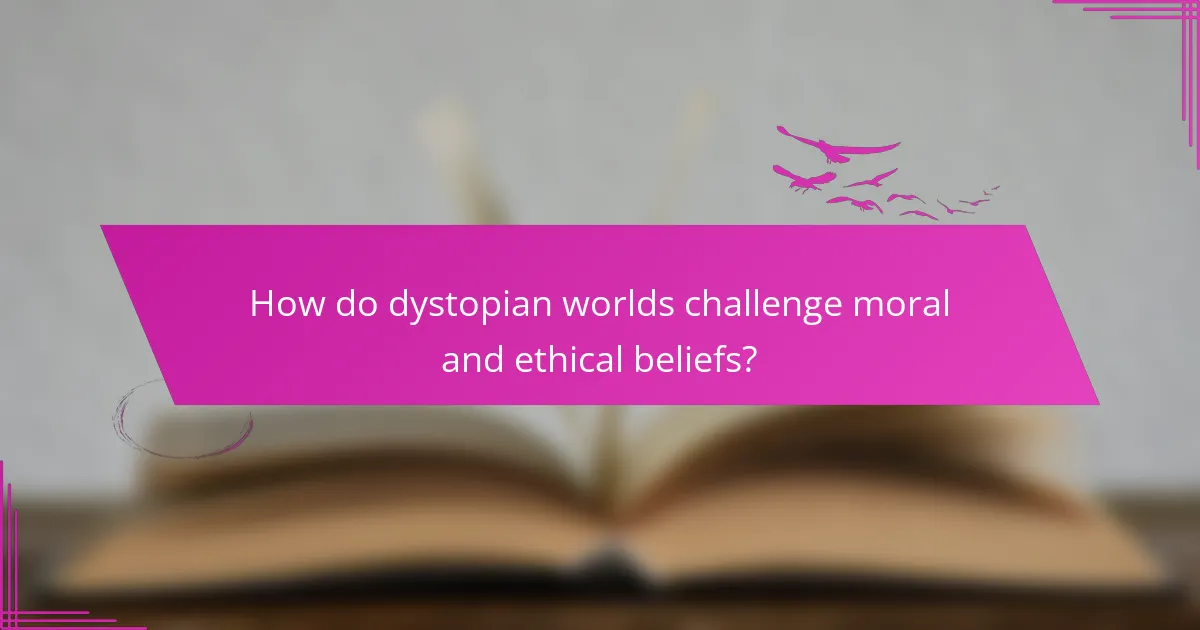
How do dystopian worlds challenge moral and ethical beliefs?
Dystopian worlds challenge moral and ethical beliefs by presenting extreme scenarios that force characters and readers to confront difficult choices. These narratives often explore themes of oppression, surveillance, and sacrifice, highlighting the fragility of human values. For example, in George Orwell’s “1984,” the manipulation of truth raises questions about individual freedom and societal control. Such environments push individuals to reassess their beliefs, revealing the complexities of morality under pressure. Dystopian literature serves as a mirror, reflecting contemporary societal fears and ethical dilemmas.
What dilemmas do characters face that reflect real-world ethical issues?
Characters in dystopian narratives often face dilemmas that mirror real-world ethical issues, such as freedom versus security. These conflicts highlight the struggle between individual rights and societal control. For instance, characters may grapple with the morality of sacrificing personal freedoms for the perceived safety of the community. This reflects contemporary debates on surveillance, privacy, and state power. Additionally, dilemmas around truth and propaganda illustrate the challenges of discerning reality in a manipulated environment, resonating with modern concerns about misinformation and media influence. Ultimately, these ethical quandaries serve as a lens to examine human values in extreme circumstances.
Which philosophical theories are explored through dystopian narratives?
Dystopian narratives explore various philosophical theories, including existentialism, utilitarianism, and social contract theory. These theories reflect human struggles in oppressive societies, questioning morality, freedom, and the essence of existence. Existentialism addresses individual choice and meaning in bleak circumstances. Utilitarianism examines the consequences of actions on the greater good, often leading to ethical dilemmas. Social contract theory critiques the legitimacy of authority and governance, highlighting the tension between individual rights and societal order. Through these lenses, dystopian literature provokes deep reflections on the human condition.
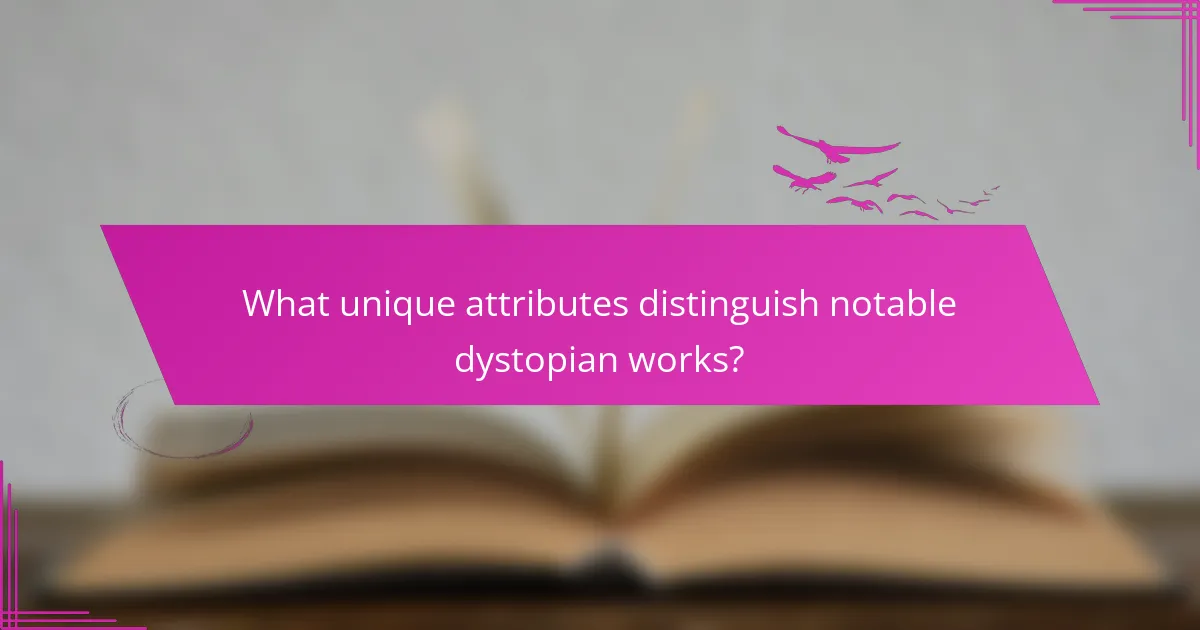
What unique attributes distinguish notable dystopian works?
Notable dystopian works are distinguished by their exploration of human resilience, societal collapse, and moral ambiguity. These attributes provoke deep philosophical reflections on the human condition. Unique narratives often highlight individual struggles against oppressive systems, showcasing characters that embody hope or despair. Rarely, works may incorporate speculative technology that alters human relationships, offering fresh perspectives on identity and existence.
How do specific authors portray the human condition differently?
Authors portray the human condition in dystopian worlds through varied lenses, emphasizing different philosophical reflections. For instance, George Orwell explores totalitarianism’s impact on individuality, while Aldous Huxley critiques consumerism and societal complacency. Ray Bradbury’s focus on censorship highlights the dangers of losing intellectual freedom. These unique approaches reveal how distinct societal fears shape their narratives. Each author uses the dystopian setting to reflect on human resilience, morality, and the consequences of societal choices. Their portrayals encourage readers to consider the implications of current societal trends on the human experience.
Which literary devices enhance the exploration of human themes in dystopias?
Literary devices such as symbolism, irony, and allegory significantly enhance the exploration of human themes in dystopian narratives. Symbolism conveys complex ideas, representing societal issues through objects or characters. Irony highlights contradictions in human behavior and societal norms, often revealing the absurdity of dystopian conditions. Allegory allows for deeper philosophical reflections, as characters and events symbolize broader human experiences and moral dilemmas. These devices collectively invite readers to reflect on humanity’s struggles, ethics, and resilience in oppressive environments.
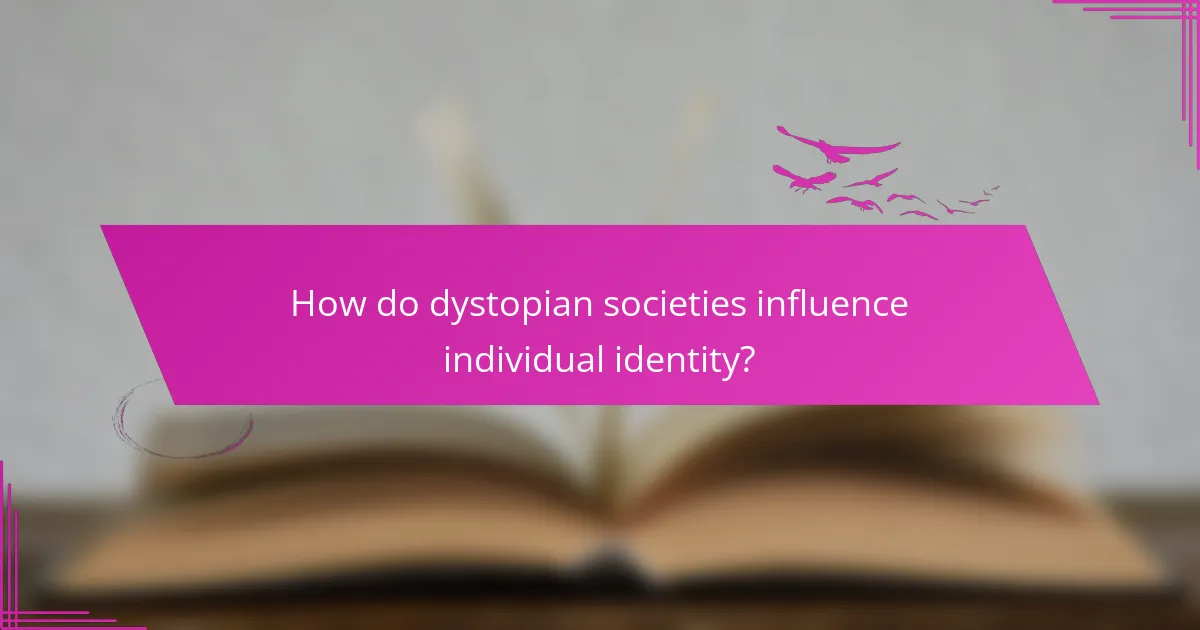
How do dystopian societies influence individual identity?
Dystopian societies profoundly shape individual identity by imposing strict norms and values. These environments often strip away personal freedoms, forcing individuals to conform to collective ideologies. As a result, identity becomes tied to survival and resistance against oppressive systems.
Literary examples illustrate how characters navigate their identities in these contexts. In George Orwell’s “1984,” Winston Smith’s struggle for personal truth highlights the conflict between individuality and totalitarian control. Similarly, in Margaret Atwood’s “The Handmaid’s Tale,” Offred’s identity is defined by her subjugation, yet her memories reveal her resistance.
Dystopian narratives often explore the psychological impact of such societies. Characters may experience fragmentation of self, leading to a crisis of identity. This reflects a unique attribute of dystopian literature: the exploration of identity under extreme societal pressures.
Ultimately, dystopian settings serve as a mirror, reflecting societal fears and the resilience of the human spirit. They challenge readers to consider the value of individuality amidst conformity, prompting deep philosophical reflections on the human condition.
In what ways do characters navigate their identities in oppressive environments?
Characters navigate their identities in oppressive environments through resistance, adaptation, and self-discovery. They often confront societal norms and redefine their beliefs. For example, in dystopian literature, protagonists may challenge oppressive regimes, revealing their true selves. This struggle shapes their character development and highlights the resilience of the human spirit. Moreover, unique attributes, such as moral dilemmas and personal sacrifices, further illustrate their navigation of identity amidst adversity.
How is the concept of freedom portrayed in dystopian literature?
In dystopian literature, freedom is often portrayed as an illusion, highlighting the struggle against oppressive societal structures. Characters frequently face severe restrictions on their autonomy, reflecting the consequences of totalitarian regimes. Works like “1984” and “The Handmaid’s Tale” illustrate how surveillance and control strip individuals of their rights. The portrayal of freedom serves as a critique of real-world issues, emphasizing the importance of personal agency and the dangers of complacency in the face of authoritarianism. These narratives provoke philosophical reflections on the nature of freedom and its value in the human condition.
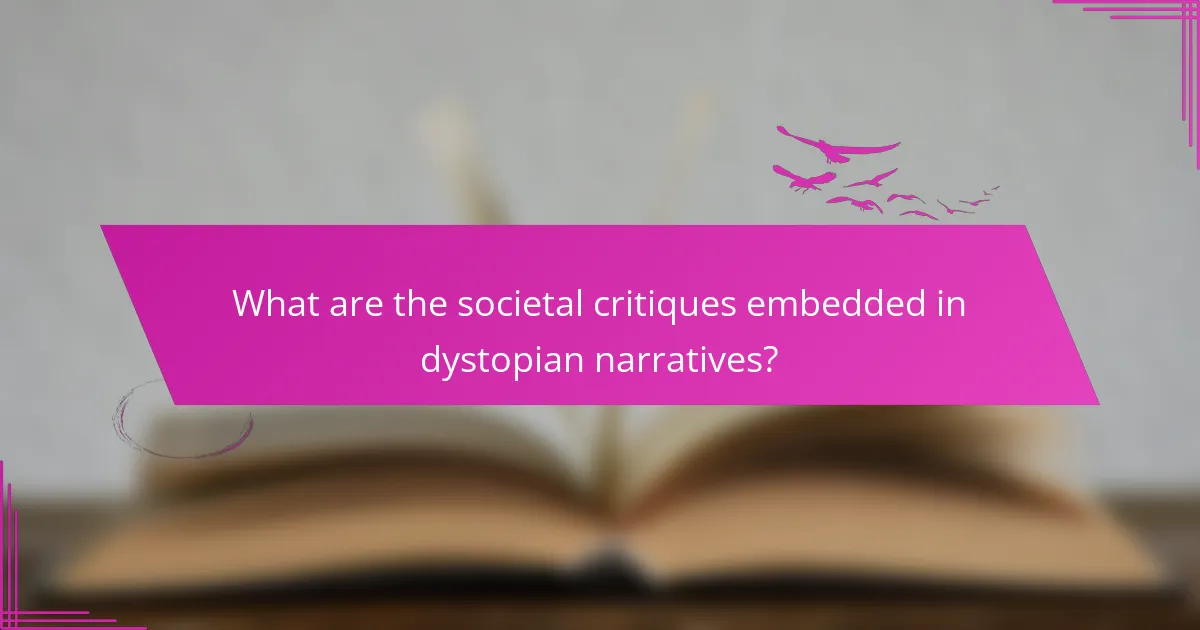
What are the societal critiques embedded in dystopian narratives?
Dystopian narratives often critique societal structures, highlighting themes of oppression, surveillance, and loss of individuality. These critiques reflect fears about technological advancement and authoritarian governance. For example, George Orwell’s “1984” illustrates the dangers of totalitarianism, emphasizing the erosion of personal freedoms. Similarly, Aldous Huxley’s “Brave New World” critiques consumerism and the pursuit of pleasure at the expense of genuine human connection. These narratives serve as cautionary tales, urging reflection on contemporary societal issues.
How do dystopian stories reflect contemporary social issues?
Dystopian stories often mirror contemporary social issues, highlighting fears and challenges in society. They serve as cautionary tales that reflect anxieties about government control, environmental degradation, and social inequality. For example, George Orwell’s “1984” critiques totalitarianism, emphasizing the dangers of surveillance and loss of individual freedom. Similarly, Margaret Atwood’s “The Handmaid’s Tale” explores themes of gender oppression and reproductive rights, resonating with current discussions on women’s autonomy. These narratives encourage readers to confront uncomfortable truths about their world, prompting critical reflection on the human condition and societal values.
Which dystopian works have sparked significant cultural discussions?
Dystopian works that have sparked significant cultural discussions include “1984,” “Brave New World,” and “The Handmaid’s Tale.” These narratives explore themes of surveillance, societal control, and gender oppression, prompting critical reflections on contemporary issues.
“1984” by George Orwell critiques totalitarianism and individual autonomy, resonating in today’s discussions about privacy and government overreach. Aldous Huxley’s “Brave New World” addresses consumerism and technological control, paralleling concerns about modern society’s direction. Margaret Atwood’s “The Handmaid’s Tale” highlights gender inequality, inspiring movements for women’s rights and social justice.
Each work serves as a lens through which readers examine the human condition, raising questions about morality, freedom, and societal structures. Their relevance persists, making them essential in cultural discourse.
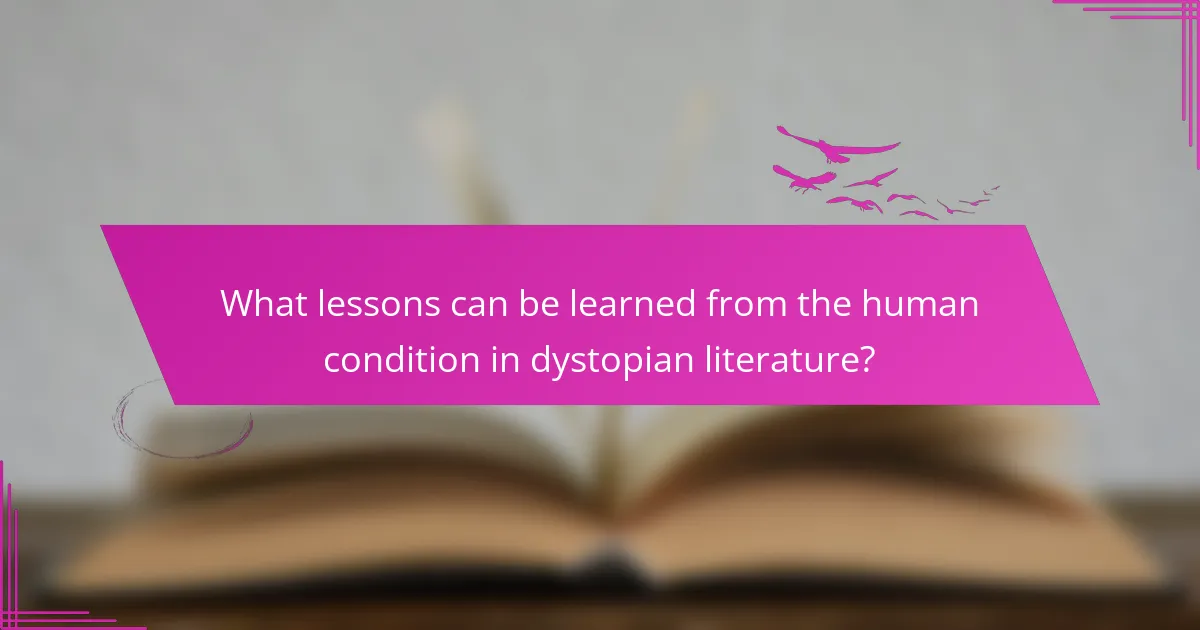
What lessons can be learned from the human condition in dystopian literature?
Dystopian literature teaches profound lessons about the human condition, emphasizing resilience, morality, and societal flaws. Characters often face oppressive regimes, revealing the struggle for autonomy and ethical dilemmas. These narratives highlight the consequences of dehumanization, prompting reflection on personal and collective responsibility. As a result, readers gain insights into the fragility of freedom and the importance of empathy in maintaining humanity.
How can readers apply insights from dystopian narratives to real life?
Readers can apply insights from dystopian narratives to real life by recognizing societal flaws and questioning authority. Dystopian stories often highlight themes of oppression, surveillance, and environmental degradation, prompting critical reflection on current issues. For example, George Orwell’s “1984” illustrates the dangers of totalitarianism, encouraging vigilance against governmental overreach. Similarly, Margaret Atwood’s “The Handmaid’s Tale” warns about the erosion of women’s rights, inspiring activism for gender equality. Engaging with these narratives fosters awareness and motivates individuals to advocate for change in their communities.
What are common misconceptions about dystopian literature and its messages?
Many misconceptions exist about dystopian literature, often oversimplifying its messages. One common belief is that these narratives merely predict bleak futures without deeper philosophical insights. In reality, they explore complex themes of power, morality, and human resilience, prompting readers to reflect on societal structures. Another misconception is that dystopian works are purely cautionary tales. While they serve this purpose, they also inspire hope and highlight the potential for human agency. Additionally, some assume that all dystopian literature focuses solely on technology’s dangers. However, many stories emphasize psychological and social dimensions, revealing how fear and control shape the human condition.
What best practices can enhance the understanding of dystopian themes?
Analyzing dystopian themes effectively requires engaging with philosophical reflections and literary analysis. Focus on character motivations, societal structures, and moral dilemmas to deepen understanding. Examine how these elements reflect the human condition amidst adversity. Consider the unique attributes of each dystopian narrative, such as its cultural context or authorial intent, to enhance insights. Engage with comparative analyses of different works to uncover common themes and rare perspectives on human resilience.
